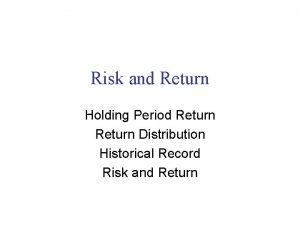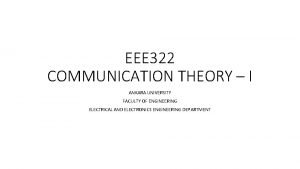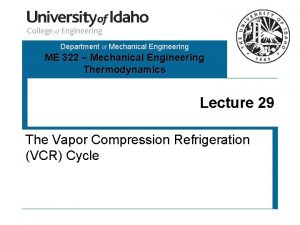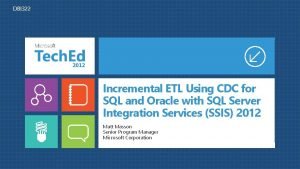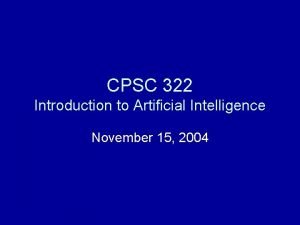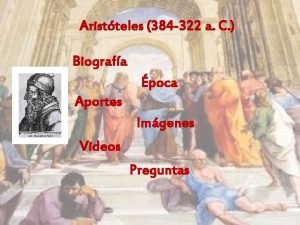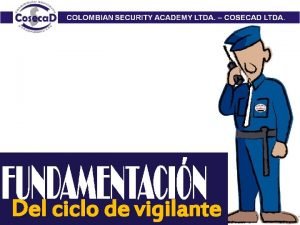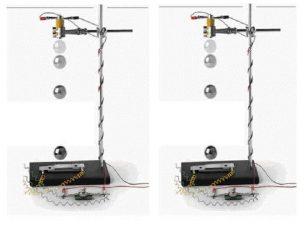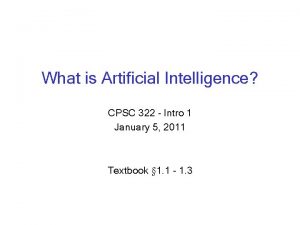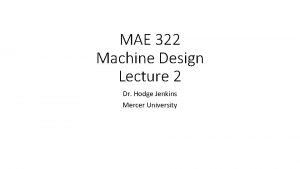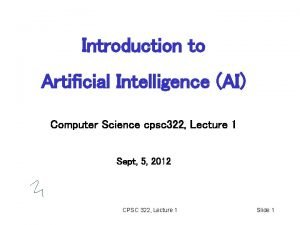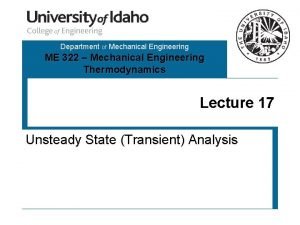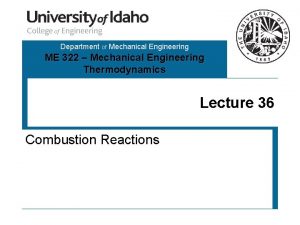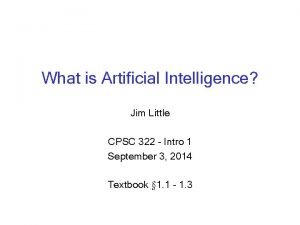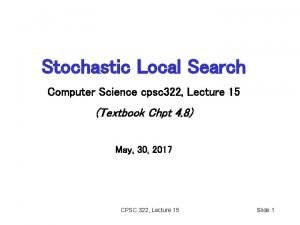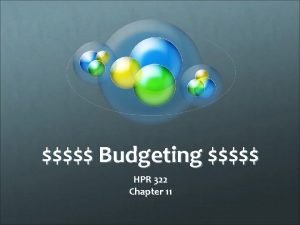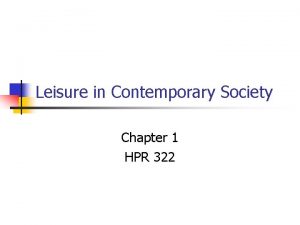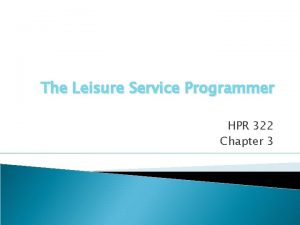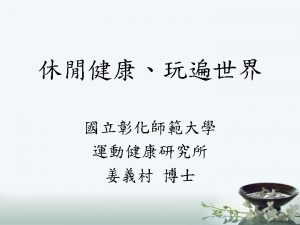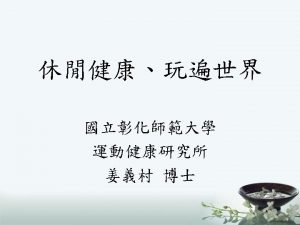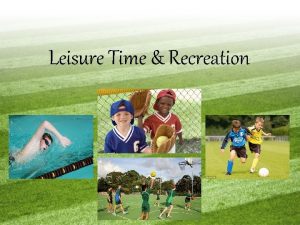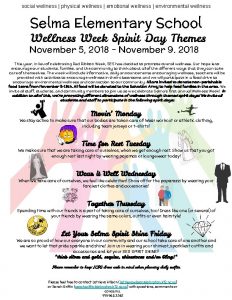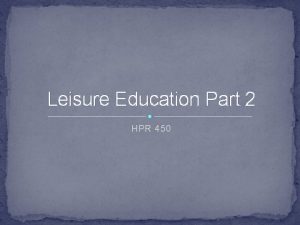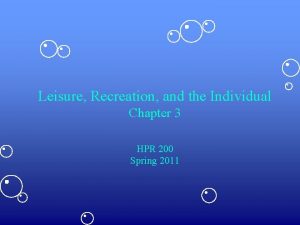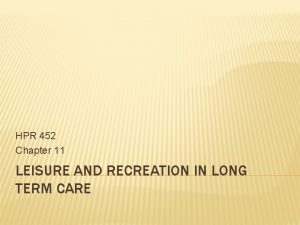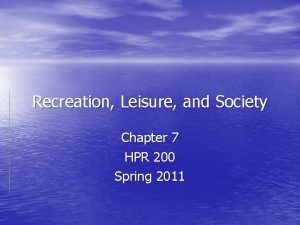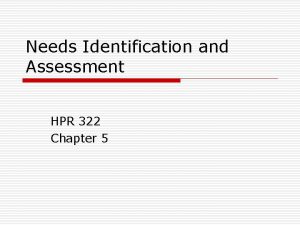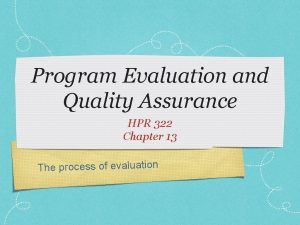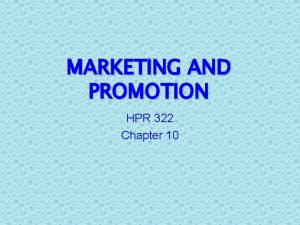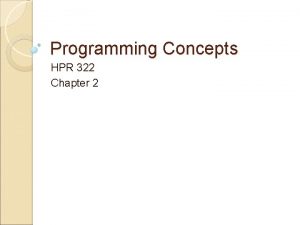Leisure Wellness and Education HPR 322 Chapter 14


















- Slides: 18

Leisure Wellness and Education HPR 322 Chapter 14

�Leisure Education is a paramount function of Leisure Programming �Individuals with disabilities face barriers (constraints) to leisure participation �Undeveloped leisure can be a primer for deviant behavior �Some people avoid leisure participation because they don’t understand what it is or the benefits �Having free time is not beneficial unless you know how to use it properly

�Watching TV can have some benefits but heavy TV watching can have harmful effects: �Development of sedentary lifestyle that contributes to heart disease, obesity, hypertension, and other illnesses �Individual and community isolation �Development of violent behaviors via social learning theory �Decrease of quality time or meaningfulness in life

�Individuals seek more meaningful leisure experiences �Desire to develop appropriate skills, knowledge, attitudes required for successful participation.

Leisure Wellness �Access to information �Decision Making �Clarify Leisure-related values �Traditional strategies � Instructional programs and services

Leisure Barriers �Attitudinal – ex. Must be athletically gifted to participate in physical fitness �Communicative – Agency must provide clear, accurate, and meaningful info about offerings. Individual must be able to send and receive messages �Consumptive – Purchasing “experiences which are “in vogue” but don’t match needs �Economic – Lack of discretionary funds and individuals associate “value” with “cost”

Barriers (cont’d) �Experiential – No experience so activity is avoided �Health - Illnesses and conditions may prevent participation physically, emotionally, socially – Adaptations necessary �Leisure Awareness – “Leisure Ethic’ – Lack knowledge of benefits, resources, skills �Physical Resource – Lack of facilities and overcrowding – National Parks are being “loved to death” - Facilities in communities “run down”

Barriers (cont’d) �Social Cultural – Attention must be given to needs based on diversity – racial, ethnic, social, economic, political, and cultural �Temporal – Not having enough time or quality time to pursue leisure interests �Work schedules, year around schools, flextime, four day work weeks require new approaches to address customer’s needs

Leisure Education �Developmental process through which individuals or groups of people increase their understanding of leisure and the relationships among leisure, lifestyle, and society (Mundy, 1998) �Develops �Skills that develop competencies �Knowledge of leisure experiences available (resources) �Experience increases confidence and desire to explore �Attitudes, Values, Appreciation – Positive perception of leisure

Components of Leisure Education �Leisure Appreciation �Self-Awareness �Decision-Making �Self-Determination �Leisure Activity Skills �Community Skills �Social Skills �Leisure Resources

Components represent Goals that may be achieved by clients through Leisure Education �Leisure Appreciation �Assess attitudes toward leisure and assist clients in becoming aware that leisure offers benefits �Self-Awareness �Clients examine their leisure lifestyle to become aware of leisure values, patterns, behaviors, barriers so they make alterations

�Decision-Making �Many individuals with disabilities have not had opportunities to engage in decision-making �Self-Determination �Being in control of the course a life takes �CTRS assists clients in identifying leisure preferences and assert themselves to achieve them

�Leisure Activity Skills �Archery to Yoga – Individuals need a repertoire of activities and the skills to engage �Community Skills �Skills to participate in community life �Transportation, handling money/finances �Social Skills �Overcome deficits by �Modeling appropriate behaviors, role playing, providing opportunities, reinforcing positive skills, formal training

�Leisure Resources �Information about possible community resources (places, programs, people) to meet their interests �Leisure Ed ranges from appreciation for leisure to obtaining concrete information about possible community leisure resources

�Leisure Ed may take place in �Classes �Social Skills training groups �Community Reintegration programs �Group Counseling �Individual Counseling �Counseling is a means of Leisure Ed �CTRSs are Helping Professionals and must be able to communicate therapeutically

Leisure Ability Model �Overall purpose of Leisure Education �Assist participants in acquiring leisure- related knowledge and skills so participants can eventually gain an independent leisure lifestyle (Peterson and Stumbo, 2000) �This Leisure Education Model consists of four components

�Leisure Awareness – Knowledge of leisure, self-awareness, leisure and play attitudes, and related participatory and decision-making skills �Social Interaction Skills – Dual, Small Group, and Large Group �Leisure Activity Skills – Traditional and Non. Traditional activities and skills �Leisure Resources – Activity opportunities, personal resources, family and home resources, and state and national resources

Leisure Lifestyle Center (LLC) � Dept of Recreation Management and Therapeutic Recreation at the University of Wisconsin-La Crosse �Community-Based Leisure Education Program �Begins with individualized leisure assessment in which participants become aware of leisure and self �Participants learn different skills (e. g. decisionmaking, social skills, activity skills) �The goal is to help participants experience the benefits of leisure and develop a lifestyle �Main focus is to assist individuals with disabilities
 Real rate of return formula
Real rate of return formula Hpr talent
Hpr talent Eee ankara
Eee ankara Me 322
Me 322 Sp_replincrementlsn
Sp_replincrementlsn Mycin
Mycin Biografia de aristóteles (384-322 a.c.)
Biografia de aristóteles (384-322 a.c.) De qué habla el decreto 3222
De qué habla el decreto 3222 Fe 322
Fe 322 Aristote 384-322
Aristote 384-322 Cpsc 322: introduction to artificial intelligence
Cpsc 322: introduction to artificial intelligence Br 322
Br 322 Distortion energy theory formula
Distortion energy theory formula Cpsc 322 ubc
Cpsc 322 ubc Me 322
Me 322 Me 322
Me 322 Products of fuel combustion
Products of fuel combustion Cpsc 322 ubc
Cpsc 322 ubc Cpsc 322
Cpsc 322
